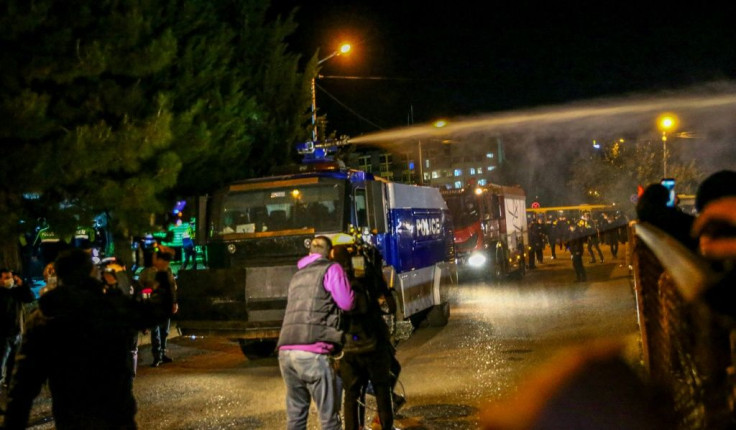Georgia Opposition Defies Crackdown, Stages New Protests
Fresh protests took place Monday in Tbilisi as thousands of people hit the streets a day after police cracked down on demonstrations against Georgia's recent general elections.
Protests erupted in Tbilisi and the Black Sea city of Batumi following an October 31 parliamentary poll won by the ruling Georgian Dream party with a two-percent margin, but which the opposition has denounced as rigged.
Some 8,000 protesters gathered outside Georgian parliament in response to a call by opposition parties that refuse to enter the new parliament, raising fears of another political crisis in the Caucasus nation.
Elections in Georgia often lead to accusations of fraud and large demonstrations.
On Monday, police detained at least three demonstrators, protest organiser Giorgi Pataraia told AFP.
The ruling party, led by billionaire ex-prime minister Bidzina Ivanishvili, flatly denies accusations of electoral fraud.
In an unprecedented show of unity before the vote, the main opposition party, exiled former president Mikheil Saakashvili's United National Movement (UNM), agreed with smaller opposition groups to form a coalition government if elected.
Demonstrators have since vowed permanent protests until new elections are called -- a demand that Georgia Dream has rejected.
"Our ranks will not waver, our protests will continue until we achieve the holding of free and fair elections in Georgia," Nika Melia, an UNM leader, told the crowd before announcing another protest at the end of the week.
"We are defending our votes and will continue our struggle until our demand is met," demonstrator Levan Meburishvili, 22, told AFP.
On Sunday, 45,000 protesters rallied outside parliament before marching several kilometres (miles) across the city towards the central election commission headquarters, threatening to blockade its entrances.

Riot police broke up the peaceful protest late at night, firing water cannon and injuring several people, television footage showed.
Police also reportedly used tear gas, which the interior ministry denies.
Georgia's rights ombudsperson Nino Lomjaria denounced the use of "disproportionate force against demonstrators."
Prime Minister Giorgi Gakharia called the police crackdown "legitimate," claiming that protesters had stormed the election commission building.
Gakharia, who has tested positive for the coronavirus, has been in self-isolation for a week and announced a night curfew starting Monday.
Some protesters and opposition leaders nonetheless vowed to stage round-the-clock rallies outside parliament.
The electoral commission has yet to confirm provisional results that showed Georgian Dream had won 48 percent of the votes, against 46 percent for opposition parties, in a proportional ballot that decides 120 of the legislature's 150 seats.
Owing to Georgia's complex electoral system, the parliament's final makeup might only become clear in late November.
An opposition boycott could weigh heavily on Georgian Dream's political legitimacy.
International monitors from the Organization for Security and Co-operation in Europe (OSCE) said the vote was "far from flawless" but that "fundamental freedoms were respected."
Local election observers reported numerous violations and 27 rights groups said in a joint statement that "the Georgian government has failed to meet democratic standards."
© Copyright AFP {{Year}}. All rights reserved.





















